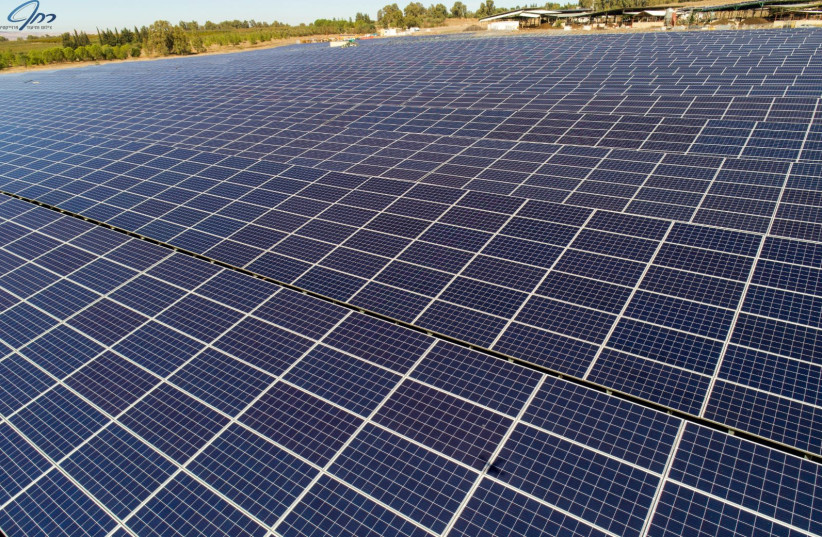BIRD Energy aims to foster collaborative projects between Israeli and American companies
By MAYA MARGIT/THE MEDIA LINE MARCH 16, 2021

Solar panels at one of the projects of Enlight Renewable Energy (photo credit: RACHAF PRO DRONE)
The US Department of Energy (DOE), together with Israel’s Minister of Energy and the Israel Innovation Authority, on Monday announced $4 million in funding for innovative clean energy technologies. The funding comes from Binational Industrial Research & Development (BIRD) Energy, a program that bolsters joint US-Israel ventures and aims to promote green energy technologies.
“The climate emergency is a global emergency – and the more we share resources and ideas with allies around the world, the closer we get to the clean energy solutions needed to reach net-zero carbon emissions by 2050,” Secretary of Energy Jennifer M. Granholm said in a statement that was shared with The Media Line.
“BIRD Energy has a demonstrated record of success driving innovation in renewable energy and energy efficiency that will help us combat the climate crisis.”BIRD Energy, which was established by the Energy Independence and Security Act of 2007, funds ventures that commercialize sustainable energy technologies. The DOE’s announcement came during an annual three-day virtual summit that was organized in collaboration with the California Israel Chamber of Commerce, the Texas-Israel Alliance and the BIRD Foundation.
Titled “US-Israel Disruptive Cleantech Innovation,” the ongoing event featured hundreds of participants and distinguished speakers, including American and Israeli government officials.“
The goal is to promote the collaboration both between the United States and Israel, and specifically Texas, California and Israel,” Shiri Freund Koren, an Austin resident who leads the BIRD Foundation’s operations in Texas, told The Media Line. One of the featured companies is Addionics, a startup jointly based in Tel Aviv and London that is developing the next generation of rechargeable batteries.
“In a battery you have four components that haven’t changed for 50 years, which is anodes, cathodes, separators and electrolytes,” Moshiel Biton, CEO and co-founder of Addionics, told The Media Line, adding that the startup’s 3D metal fabrication method aims to improve the performance, durability, cost and charging time of batteries. Addionics is already working with several industries, including automotive, micro-mobility and consumer electronics.
The company has so far raised $8 million in funding from various investors.Thanks to a BIRD Energy program grant worth $1 million, Addionics is also working together with Saint-Gobain Ceramics and Plastics, which is based in Northborough, Massachusetts. The two are in the process of developing solid-state batteries, which rely on solid electrodes and a solid electrolyte rather than the liquid or polymer gel found in current lithium-ion or lithium polymer batteries.“It’s the holy grail – mainly for the automotive [industry] – but not only,” Biton said. “It could change the world.”Although batteries provide an alternative to fossil fuels, the use of lithium is unsustainable and its extraction also carries a heavy environmental impact.
“If we really want to decarbonize and move to a sustainable world, batteries will [need to] be able to store more energy,” he said. Chakratec is another company that recently received a grant from BIRD Energy. Headquartered in the Israeli city of Lod, the startup has developed a special energy storage system based on a fast-rotating flywheel concept.“
The mass is rotating at a very high speed and the energy is stored within the spin of the mass as kinetic energy,” Daniel Raanani, marketing and communications manager at Chakratec, told The Media Line. Unlike most lithium-ion-based batteries on the market today, which are chemical-based, Chakratec’s system is entirely electromechanical. Because of this, the solution emits significantly less CO2 than its traditional chemical-based counterparts.It is also extremely durable, according to Raanani, and can last 20 years while allowing for over 200,000 charge and discharge cycles. By contrast, lithium-ion batteries generally provide around 2,000 such cycles before needing to be replaced.“
As you know from your phone and laptop, batteries [suffer] from severe degradation over time,” said Raanani.At the moment, Chakratec has deployed its innovative technology in the automotive sector to recharge electric vehicles (EV), which represent a growing portion of the industry.“In order to charge an EV battery in 10 minutes you need a very large charger, which requires a very strong infrastructure,” Raanani explained. “We’re talking about hundreds of kilowatts for each charger. 300 KWs is a medium-sized neighborhood in Israel and a small neighborhood in the States.”
Chakretec’s system, however, does not require existing infrastructure to be upgraded. The company is already working with several European partners, including Czech automaker Skoda.Last year, they also entered the American market. Through BIRD, they received a $900,000 grant to collaborate with Blink Charging in order to bring fast car charging to rural American areas with weak power grids.
From 2009 to 2020, BIRD Energy has funded 55 projects worth roughly $42 million in government investment. Each project receiving funding is required to be carried out by two partners –one from Israel and the other from the US – in order to qualify.The deadline to submit an executive proposal for BIRD Energy’s 2021 program is June 30, while the deadline for final proposals is August 13.
